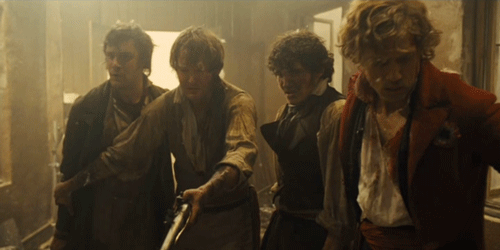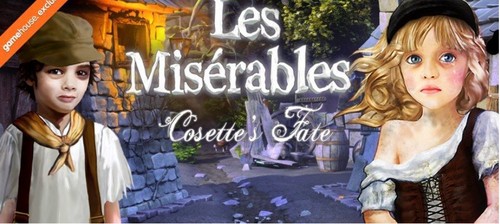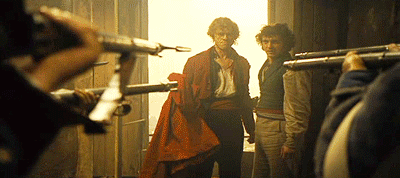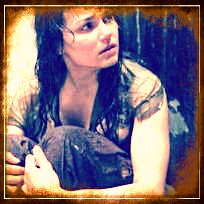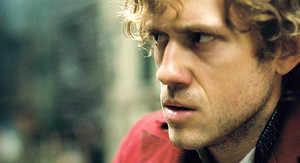What do we love Les Mis for? Well – you'll say – where should we start? The story, the characters, the music, the great performances... And, last, but not least: the lyrics.
I love the lyrics of Les Miserables and think they express much in a very simple way. I will focus on 10 texts which I've chosen and I will write what makes them so deep and worth of our attention. It's going to be a kind of litterary analysis, but not taken too strictly. The order of the songs will be like in the musical (well, this time is the exception). So, we will start with...
Valjean's soliloquy (What have I done) and Javert's suicide
Before I begin I should explain that in this case I don't see the point in analysing two texts separately. The power is in comparison. So let's compare.
In the starting point we meet two men, who faced something they cannot comprehend. Both of them didn't belive in forgiveness, moreover they didn't want it. However they were forgiven, and it has saved their lives in very literal way. They are completely lost. Hence they start to ask questions; a lot of questions appears in both soliloquies.
What have I done.../Who is this man...
What have I done? Valjean asks, however it's more like an exclamation, because he instantly answers to himself. This is the moment of realization what his life has become. He wants to know, although without much hope at this moment, if there's something more for him. Valjean wants more than living off only hatred, the cry of his hate. He cries of anger but also cries to be heard. But the anger is still there and nobody hears his cry. Valjean feels something goes wrong with his life, but he doesn't have any hope.
Here we get to the first difference. Javert also starts with the question. However, unlike Valjean, he doesn't ask what is wrong his life. He asks what is wrong with the other man, with the man that has forgiven him. What sort of devil is he? Ok, he did something what Javert finds wrong, but devil? The thing is the devil is belived to turn the things upside down – to make the lie from the truth and the truth from the lie. Javert thinks that Valjean does the same: deceives him or maybe tries some trick. Why? Simply because he's evil and wants to mislead Javert. Then at least three times he repeats almost the same thought – Valjean could have killed him, but he hasn't. Thus in the last sentence: He gave me back my life we can almost hear Javerts horror. We came to the moment when saving his life is the worst thing Javert can imagine. The other parts of the song develop it, but let's go back to Valjean.
If there's another way to go.../Damned if I'll live in the debt of a thief...
In the next part both men express their belief about their life. In Valjean's case the belief is – clear: if there's another way to go I missed it 20 long years ago. The chance of better life has disappeared forever. His life was a war that could never be won. The war is always against someone. And then they appear, the unnamed people who have ended his life, murdered Valjean. The man disappears, the number appears instead. The major source of Valjean's anger is they did it because he stole a mouthful of bread. He ephasizes that because he feels that his whole life was taken from him unjustly.
We said that Javert suspects Valjean to play some kind of game with him. He is angry (he twice curses that situation) because he is being forced to behave against his better judgement. He feels mocked and hates it, but not because of himself. As he states: He is the Law and the Law is not mocked. Although this may seem a little Louis-XIV-like to us, I think that statement is justified. He cannot separate himself from his principles, leave alone abandon them. Moreover, he despises the principles of Valjean so passionately that he could spit his pity right back in his face. Then we come to Javerts great belief: It is either Valjean or Javert. In means, firstly: the law, justice (the meaning behind Javert, he is the law) and mercy (the same for Valjean) are mutually exclusive, only one of them is right. This meaning will lead to another, but not yet.
Yet why did I allow that man.../How can I now allow this man...
Then it comes the moment when both characters start to tell us about their saviours. When Valjean says that man moved something deep in him (what is vividly expressed by touch my soul) and, even more importantly, he has taught him something, Javert doesn't say anything like that. He doesn't say his saviour has taught him anything, but he overcame him and got domininion over him. They both enumerate what was done to them. When Valjean doubts, if he deserved that goodness (Can such things be?), Javert is sure that it wasn't right. However, it's the last moment that the inspector is sure. At the end of this part we have the sentence: Instead I live, but live in hell (again the word from the religious vocabulary). What is hell for Javert? It is doubt.
Take an eye for an eye.../ And my thoughts fly apart...
Here we have two important confessions and the turning points in both soliloquies. Valjean tells us, in very simple words, what was his credo and his attitude towards the world, and that were the revenge and the lack of sympathy. Valjean surely understands the foulness of his actions. Later he will compare them to the Bishop's merciful behaviour.
When Valjean seems to understand more and more, Javert is losing his confidence. As he says his thoughts fly apart. Now he doesn't know if he should belive his saviour about forgiveness (Valjean also has sins and crimes on his conscience).
One word from him and I'd be back.../ And must I now begin to doubt...
Then in both cases some thoughts are coming gradually. Valjean firstly says that he wasn't sent back to jail (beneath the lash, upon the rack), although it could be done easily and – reading between the lines - although he deserved it. He is ashamed of himfelf (what he says in very simple but vivid words – shame inside him like a knife). Finally, he realises, that the Bishop was right. He feels shame so he does have a soul. If so, maybe he can do something to change. Unlike on the beginning, he sees that perhaps there is another way to go.
For Javert it goes otherwise. A strange thing happens – a man, who has never doubted, doubts now. But not only his mind is tortured – he is afraid (his stone heart trembles), because he is no longer certain of anything he belived in. Consequently the world he has known is lost in shadows – he doesn't see clearly. Now Javert can't distinguish if Valjean is from heaven or from hell, although he before used the word devil so easily. He is no longer sure that it was done to destroy him; he wonders if Valjean knew that his mercy in fact killed Javert. Because it does – it's a great paradox, but we can see where does it come from.
I am reaching, but I fall...
In this moment both men have realised that their previous life isn't worth anything now, so all they see around them is darkness. They stare into the void. Javert is no longer reassured by the stars (I'll write more about it when I will be analysing Stars). They both decide to finish the lives they led. For Valjean it means the life of a convict, of a foul pearson Jean Valjean was so far. For Javert, who is holding to the last belief: It is either Valjean or Javert, it means his life as a whole. Consequently when another story begins for Valjean, for Javert there is no way to go on. What happens next confirm their words. Valjean makes the first step to bury the past, Javert ends everything.
Both soliloquies start in the same point but end differently. The men with completely different nature walk through different roads in their struggle. Their speech isn't the same too. Valjean speaks more openly, he tells more often what he feels: hatred, harm, shame. He talks plainly, rather from his soul than his mind. Javert otherwise – he analyses all the time. He builds statements of what is, what it should be, what it shouldn't, asks about the reasons. His speech is more complicated, with more sophisticated metaphors and abstract words. He also has his emotional moments, but he doesn't express emotions so simply. Finally, he is the one to speak more negative words.
In my opinion, the greatest work of the lyrics' author was to find this similarity of these two situations and emphasize differences. There was created two texts very true to the characters and with a strong and clear message.
I love the lyrics of Les Miserables and think they express much in a very simple way. I will focus on 10 texts which I've chosen and I will write what makes them so deep and worth of our attention. It's going to be a kind of litterary analysis, but not taken too strictly. The order of the songs will be like in the musical (well, this time is the exception). So, we will start with...
Valjean's soliloquy (What have I done) and Javert's suicide
Before I begin I should explain that in this case I don't see the point in analysing two texts separately. The power is in comparison. So let's compare.
In the starting point we meet two men, who faced something they cannot comprehend. Both of them didn't belive in forgiveness, moreover they didn't want it. However they were forgiven, and it has saved their lives in very literal way. They are completely lost. Hence they start to ask questions; a lot of questions appears in both soliloquies.
What have I done.../Who is this man...
What have I done? Valjean asks, however it's more like an exclamation, because he instantly answers to himself. This is the moment of realization what his life has become. He wants to know, although without much hope at this moment, if there's something more for him. Valjean wants more than living off only hatred, the cry of his hate. He cries of anger but also cries to be heard. But the anger is still there and nobody hears his cry. Valjean feels something goes wrong with his life, but he doesn't have any hope.
Here we get to the first difference. Javert also starts with the question. However, unlike Valjean, he doesn't ask what is wrong his life. He asks what is wrong with the other man, with the man that has forgiven him. What sort of devil is he? Ok, he did something what Javert finds wrong, but devil? The thing is the devil is belived to turn the things upside down – to make the lie from the truth and the truth from the lie. Javert thinks that Valjean does the same: deceives him or maybe tries some trick. Why? Simply because he's evil and wants to mislead Javert. Then at least three times he repeats almost the same thought – Valjean could have killed him, but he hasn't. Thus in the last sentence: He gave me back my life we can almost hear Javerts horror. We came to the moment when saving his life is the worst thing Javert can imagine. The other parts of the song develop it, but let's go back to Valjean.
If there's another way to go.../Damned if I'll live in the debt of a thief...
In the next part both men express their belief about their life. In Valjean's case the belief is – clear: if there's another way to go I missed it 20 long years ago. The chance of better life has disappeared forever. His life was a war that could never be won. The war is always against someone. And then they appear, the unnamed people who have ended his life, murdered Valjean. The man disappears, the number appears instead. The major source of Valjean's anger is they did it because he stole a mouthful of bread. He ephasizes that because he feels that his whole life was taken from him unjustly.
We said that Javert suspects Valjean to play some kind of game with him. He is angry (he twice curses that situation) because he is being forced to behave against his better judgement. He feels mocked and hates it, but not because of himself. As he states: He is the Law and the Law is not mocked. Although this may seem a little Louis-XIV-like to us, I think that statement is justified. He cannot separate himself from his principles, leave alone abandon them. Moreover, he despises the principles of Valjean so passionately that he could spit his pity right back in his face. Then we come to Javerts great belief: It is either Valjean or Javert. In means, firstly: the law, justice (the meaning behind Javert, he is the law) and mercy (the same for Valjean) are mutually exclusive, only one of them is right. This meaning will lead to another, but not yet.
Yet why did I allow that man.../How can I now allow this man...
Then it comes the moment when both characters start to tell us about their saviours. When Valjean says that man moved something deep in him (what is vividly expressed by touch my soul) and, even more importantly, he has taught him something, Javert doesn't say anything like that. He doesn't say his saviour has taught him anything, but he overcame him and got domininion over him. They both enumerate what was done to them. When Valjean doubts, if he deserved that goodness (Can such things be?), Javert is sure that it wasn't right. However, it's the last moment that the inspector is sure. At the end of this part we have the sentence: Instead I live, but live in hell (again the word from the religious vocabulary). What is hell for Javert? It is doubt.
Take an eye for an eye.../ And my thoughts fly apart...
Here we have two important confessions and the turning points in both soliloquies. Valjean tells us, in very simple words, what was his credo and his attitude towards the world, and that were the revenge and the lack of sympathy. Valjean surely understands the foulness of his actions. Later he will compare them to the Bishop's merciful behaviour.
When Valjean seems to understand more and more, Javert is losing his confidence. As he says his thoughts fly apart. Now he doesn't know if he should belive his saviour about forgiveness (Valjean also has sins and crimes on his conscience).
One word from him and I'd be back.../ And must I now begin to doubt...
Then in both cases some thoughts are coming gradually. Valjean firstly says that he wasn't sent back to jail (beneath the lash, upon the rack), although it could be done easily and – reading between the lines - although he deserved it. He is ashamed of himfelf (what he says in very simple but vivid words – shame inside him like a knife). Finally, he realises, that the Bishop was right. He feels shame so he does have a soul. If so, maybe he can do something to change. Unlike on the beginning, he sees that perhaps there is another way to go.
For Javert it goes otherwise. A strange thing happens – a man, who has never doubted, doubts now. But not only his mind is tortured – he is afraid (his stone heart trembles), because he is no longer certain of anything he belived in. Consequently the world he has known is lost in shadows – he doesn't see clearly. Now Javert can't distinguish if Valjean is from heaven or from hell, although he before used the word devil so easily. He is no longer sure that it was done to destroy him; he wonders if Valjean knew that his mercy in fact killed Javert. Because it does – it's a great paradox, but we can see where does it come from.
I am reaching, but I fall...
In this moment both men have realised that their previous life isn't worth anything now, so all they see around them is darkness. They stare into the void. Javert is no longer reassured by the stars (I'll write more about it when I will be analysing Stars). They both decide to finish the lives they led. For Valjean it means the life of a convict, of a foul pearson Jean Valjean was so far. For Javert, who is holding to the last belief: It is either Valjean or Javert, it means his life as a whole. Consequently when another story begins for Valjean, for Javert there is no way to go on. What happens next confirm their words. Valjean makes the first step to bury the past, Javert ends everything.
Both soliloquies start in the same point but end differently. The men with completely different nature walk through different roads in their struggle. Their speech isn't the same too. Valjean speaks more openly, he tells more often what he feels: hatred, harm, shame. He talks plainly, rather from his soul than his mind. Javert otherwise – he analyses all the time. He builds statements of what is, what it should be, what it shouldn't, asks about the reasons. His speech is more complicated, with more sophisticated metaphors and abstract words. He also has his emotional moments, but he doesn't express emotions so simply. Finally, he is the one to speak more negative words.
In my opinion, the greatest work of the lyrics' author was to find this similarity of these two situations and emphasize differences. There was created two texts very true to the characters and with a strong and clear message.






